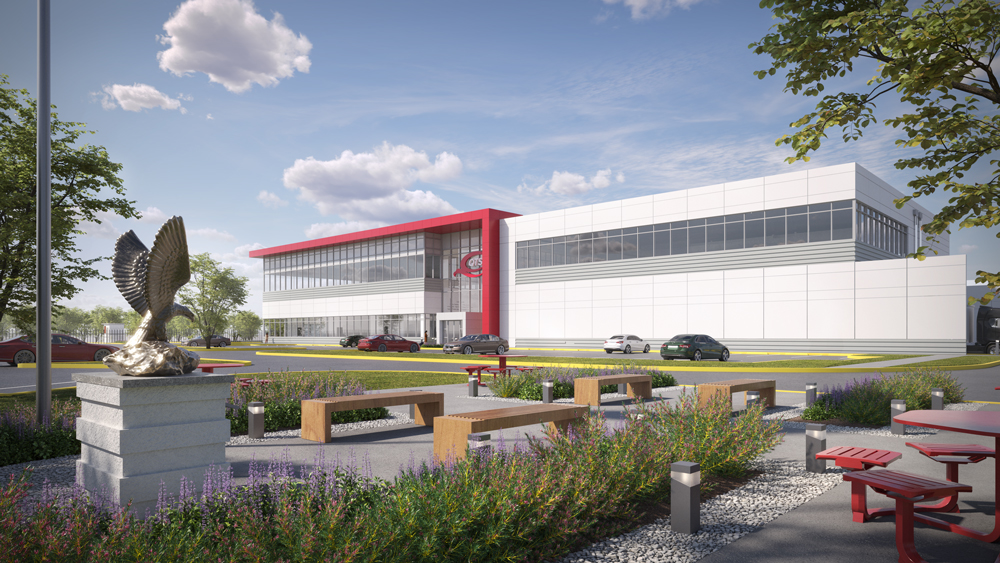JLL, QTS and Grand Rapids build new talent pools by starting upstream.
With a record wave of investment going into building new data centers worldwide, demand for qualified workers to staff these mission-critical facilities has never been greater.
Matt Landek, managing director for data center and telecom at JLL Work Dynamics, put it this way: “There are nearly 39 gigawatts of data center space under construction globally, and the ability, especially from investor clients, to recruit and retain qualified talent to have the processes to deliver on day one is becoming more and more of a challenge.”
Because of that, JLL is thinking outside the traditional data center box and teaming up with the Nomad Futurist Foundation to train the next generation of data center operators. “We at JLL fiercely believe in cultivating new talent and nurturing professional growth, which is why we facilitate technical training for our workforce across various job roles and are expanding the training to Nomad Futurist Foundation participants,” said Landek.
NFF is a non-profit organization set up to introduce young people to the world of working in digital infrastructure and then equip them with the skills needed to pursue a rewarding and meaningful career in that sector. NFF focuses on working with teenagers who come from underprivileged backgrounds.
JLL announced its partnership with NFF last March with an eye on closing the critical labor shortage gap in the data center industry. “This is a technical development program for any mission-critical space,” says Landek. “It has multiple levels of training. This is a 200-hour program that each employee will go through. We start by baselining each high school student’s knowledge through 56 modules. We will help them go through each phase of the program to get them to be a top-level employee.”
Just how critical is the need? A recent Uptime Institute Staffing Survey found that half of all data center operators report they are having problems finding junior and mid-level operations staff; and more than 40% say they cannot find enough help for electrical jobs. A third say they are having difficulty hiring enough mechanical technicians.
“Our first class will come in early 2025,” says Landek. “The program will have three options: 100% in person, 100% online or hybrid. We are focusing on underserved communities to make sure they have access to these high-paying jobs.”
Landek notes that technicians with no college degree can earn $60,000 a year as a starting wage working in a data center. Within five years, they can be earning more than $100,000 annually.
The data center market is forecast to grow by around 10% ANNUALLY through 2030.
Source: NAI
QTS Recruits Military Vets
QTS Data Centers is also upping the ante on worker training. QTS is in the middle of a 1.5-million-sq.-ft. data center campus expansion in Henrico County in Greater Richmond, Virginia. Sarah Wurth of QTS says the firm has enjoyed success in hiring and retaining qualified workers by offering competitive pay and benefits. “Our culture and competitive benefits are differentiators in attracting and retaining our employees,” she says.
QTS provides and funds ongoing training and certifications for facility operations, technology operations and information security personnel. Their top recruits are military veterans. About 40% of QTS’ operations staff have served in the U.S. Armed Forces.
QTS is part of a rapidly growing Virginia data center hub that employed 26,000 people and generated an economic output of $46 billion in 2023.

“There are nearly 39 GW (gigawatts) of data center space under construction globally today, and the ability — especially from investor clients — to recruit and retain qualified talent to have the processes to deliver on day one is becoming more and more of a challenge.”
— Matt Landek, Managing Director, Data center & Telecom, JLL Work Dynamics
Grand Rapids Goes to School
Another market taking aim at this sector is Grand Rapids, Michigan, where Switch recently announced that it would expand its iconic pyramid-shaped data center complex with a $700 million investment.
The Right Place, the economic development agency representing Grand Rapids, launched a comprehensive Right Place Tech Strategy three years ago to cultivate and attract more digital talent to the region of Western Michigan. Andria Romkema, senior vice president of marketing and communications for The Right Place, says the goal of the campaign is to take tech talent from 6% of the regional workforce to 10%. “Our goal is to net 20,000 new jobs in technology by 2030,” Romkema says.
She notes that Grand Rapids Community College received a grant to support artificial intelligence programs and is launching an AI incubator. “Ferris State just built a digital learning center, and Grand Valley State launched a brand-new College of Computing,” adds Romkema. “We know that we will have to reskill some people for jobs in these fields.”
To date, Switch has hired more than 1,000 technicians to work at its giant campus in Caledonia, with plans to hire many more workers in coming years as the expansion gets built out.
A spokesperson for Switch says that the new building will open in the second quarter of 2025. “There are further expansion plans at that site, including a third building, but it’s very early in the planning process,” the spokesperson said.

QTS is building a new data center campus in Henrico County in Greater Richmond, Virginia. About 40% of the personnel employed by QTS are military veterans. Rendering courtesy of QTS
Proliferation Mandates Creativity
Andy Cvengros, managing director with JLL’s Data Center Markets team, says that there is a “tremendous amount of competition among providers to staff up these buildings. In rural areas, there are not a lot of people who can staff them. This is not stopping massive amounts of capital from trying to get into that space.”
The rush to build new space is especially pronounced in Dallas, Chicago, Phoenix and Atlanta, says Cvengros. “The greater Ashburn area of Loudoun County in Northern Virginia is out of power for the foreseeable future, and that is driving more projects to Greater Richmond and the interior part of Virginia.”
The bottom line: Companies that think outside the box will stand the greatest chance of hiring the best data center workers first.

